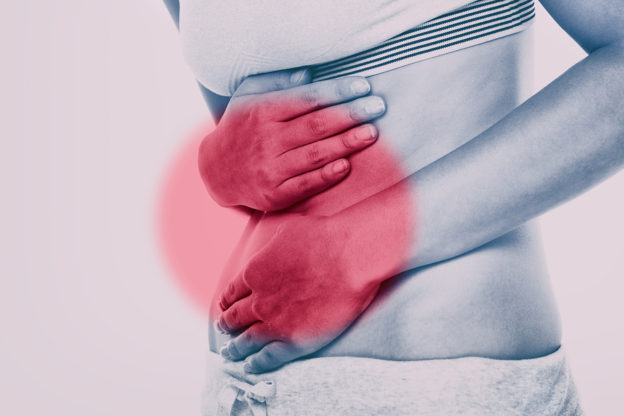By David Blyweiss, M.D., Advanced Natural Wellness
March 30, 2020
I have a medical history taking habit I can use with some new patients…
Let’s say they’re about 20-years-old… they’re having trouble with certain foods and dealing with off and on intestinal pain, frequently with diarrhea, occasionally with a bit of blood in the toilet bowl.
In no time at all, I can start making a few assumptions about their early childhood…
“Let me guess… you were born via C-Section. You were bottle fed rather than breast fed. And you were probably given several types of antibiotics to battle illness before the age of three. Does that sound about right?”
Their response, “Why yes! How’d you guess all that?”
Well, it’s not magic. It’s science.
I know it because these three factors – C-sections, breastfeeding, and antibiotics – can have an enormous impact on your gut health. Luckily, there are a few things you can do to improve your gut health at any age.
Your Early Life Can Impact Long-term Gut Health
According to the National Institute of Health, around 60-70 million people are affected by digestive diseases at any given time.[1] This includes diseases like Crohn’s Disease and Ulcerative Colitis.
And the roots of these diseases start the very moment you come into this world.
MD Exposes the Hidden Danger to Your Eyes

When your eyesight starts to fail, it's a real problem. Suddenly you can't go to the grocery store... you can't get to the doctor if you have an emergency... you can't meet your friends for dinner…
Your "regular" doctor doesn't have time to keep up with the latest research. And the same goes for eye doctors. They go to school to learn how to fit you for glasses and contacts, but have no way of preventing the damage and loss of eyesight that threatens your freedom and independence.
Let me show you something that explains a LOT about how your eyes work.
In my FREE Special Report, I'll show you a HUGE, untapped resource for your eyes that safely and naturally restores clear, effortless eyesight.
Click here to get started...
It’s true that a natural vaginal birth is better for your lifelong gut health. This is because you were given a precious genetic gift from your mother — a sampling of her own body’s microbiome.
And, as we know, a healthy and diverse microbiome is the key to proper digestion, immunity, early cognitive functioning and maturity, and the production of important B-vitamins to name just a few.
Your gut even creates neurotransmitters and influences your mood. It does so much!
Breastfeeding is the second way you may have gained an advantage from your mother…
Kids born today have it a little harder than you did years ago. A recent CDC report shows that 83.2% of babies are started out on breast milk today. But many of them are switched to formula before the recommended age of six-months.[2]
What are we doing here?
Well, we’re giving our youngsters some pretty big obstacles to overcome right out of the gate.
You may be surprised to learn that the bacteria strains inside your gut stick around for decades.
And, as we’ve illustrated above, family members often share strains. The earliest colonizing bacteria have the potential to provide health benefits for your entire life![3]
So, think of your gut microbiome like a faithful friend that matures with you year after year. And it all starts right when you’re born – in that first year of life – when your gut microbiome begins to evolve and mature.[4]
How we experience life during those first few months can have lasting impacts on gut health and wellness.
“Shot Gun Antibiotics” Are Creating Resistant Bacteria
Now, it’s possible you have no idea how you were born or fed as a youngster. But this third gut health influencer is much easier to spot in the later years of your life. It’s antibiotics!
Now, I am definitely not against antibiotics…
There are times when these drugs are absolutely needed. But, doctors tend to use them like a shotgun to cover every possible cause of an illness including viruses that just them shrug off as ineffective.
Think of a child or grandchild with an earache…
The World's Quickest Solution for Ending Prostate and Urinary Misery
This has recently been revealed to be one of the only real breakthroughs in prostate health.
The seeds of a strange fruit (sometimes called "Chinese Apples") hold powerful phytonutrients that are a revolution in prostate health.
In fact, UCLA and Veterans Administration research have now proved this to be true.
Not only that, but it may be the worlds quickest solution for ending prostate misery.
Simply stated, these phytonutrients represent a huge step beyond beta sitosterol, saw palmetto, and other phytosterols alone.
Simply click HERE if you want to have fast prostate relief...restful, uninterrupted sleep...no more constant "urges to go"...enhanced virility...and optimal prostate support for life.
Without a second thought, many doctors will prescribe Amoxicillin to wipe out the infection – along with the child’s entire gut microbiome.
Similar drugs are quickly prescribed for other adult illnesses like sore throats…
A much better solution would be to do a culture and sensitivity test of the sore throat to see what’s going on. This way, doctors can identify the specific type of bacteria and use a specific antibiotic to cure the infection.
Or, maybe you have a viral throat infection…
Again, there’s a good chance a doctor will wrongly prescribe an antibiotic rather than simpler remedies. Even some simple application of heat would bring blood to the area and help heal the little infection.
Many doctors don’t consider how the overuse of antibiotics can wipe out all the bacteria in a gut (even the good ones!)Think of napalm carpet bombing a forest.
Plus, it lessens the power of those antibiotics when they are actually needed.
Just look at Bactrim – a common antibiotic used to combat urinary tract infections.
Dangerous E.coli with resistance to Bactrim have risen from 17.9% to 24.2% resulting in large segments of the population who don’t respond to the medication.[5]
This “shotgun” style of antibiotic use early in life is setting up kids for problems like eczema, atopic dermatitis and asthma later in life.
Down the road, people who were overprescribed with antibiotics lose tolerance to certain foods, experience autoimmune reactions, and are more likely to end up with diseases like Crohn’s or Ulcerative Colitis.
Steps to Improve the Health of Your Gut Microbiome Later in Life
But you are not completely without hope.
There are a number of things you can do to help bolster your gut health for years to come.
Simple things can affect your microbiota composition and diversity. The foods you eat, your lifestyle habits, drugs you take, your level of physical activity, how much you travel, and even your hygiene can have a positive effect on your microbiome.[6]
A gut-friendly diet is usually my first recommendation for people. I say this because it encourages the right types of gut bacteria to grow and thrive.
Friendly bacteria crave soluble fiber they can metabolize and work on to grow. This means they don’t want white rice, processed flour, and sugary drinks. Instead, they want things like celery,jicama, sunchokes and artichokes, garlic and onions.
You can also try drinking kombucha to gain both pre- and probiotics along with digestive enzymes in a drink. I don’t make my own kombucha but rather spend the two and a half dollars to buy it from the store. But I try to drink it every night with my dinner.
In return for these gut-friendly foods, your good gut bacteria reward you with something called N-Butyrate. This helps turn over cells you need in your colon, helps your DNA, and prevents colon cancer.
Your gut also produces B-vitamins, neurotransmitters, and helps control your moods. It does so much!
By feeding your body the right types of foods, you will encourage the growth of those “good guy” bacteria fairly quickly. In fact, what you each can change your gut microbiome within 48 hours!
So, if you’re drinking kombucha and you’re eating 75-85% vegetables, your gut will love you!
Oh and remember chewing your food enough…20-30 times before you swallow is important as the first step to better gut health.
Sources:
[1] National Institutes of Health, U.S. Department of Health and Human Services. Opportunities and Challenges in Digestive Diseases Research: Recommendations of the National Commission on Digestive Diseases. Bethesda, MD: National Institutes of Health; 2009. NIH Publication 08–6514.
[2] CDC Releases 2018 Breastfeeding Report Card. https://www.cdc.gov/media/releases/2018/p0820-breastfeeding-report-card.html
[3] Faith, JJ, et al. “The long term stability of the human gut microbiota.” Science. 2013 July 5;341 (6141). https://www.ncbi.nlm.nih.gov/pubmed/23828941
[4] Backhed, F. et al. “Dynamics and Stabilization of the Human Gut Microbiome during the First Year of Life. Cell Host Microbe. 2015 May 13: 17(5):690-703. https://www.ncbi.nlm.nih.gov/pubmed/25974306
[5] Greenwood, Veronique. Discover Magazine. “E. Coli That Cause Urinary Tract Infections are Now Resistant to Antibiotics” 2012 May 2. https://www.discovermagazine.com/health/e-coli-that-cause-urinary-tract-infections-are-now-resistant-to-antibiotics
[6] Nagpal, R. et al. “Gut microbiome and aging: Physiological and mechanistic insights.” Nutrition and Healthy Aging. Vol 4, no 4, pp 267-285, 2018. https://content.iospress.com/articles/nutrition-and-healthy-aging/nha170030







